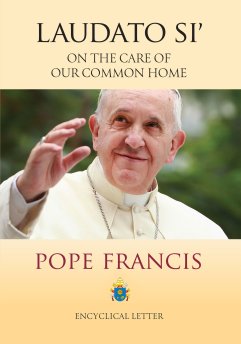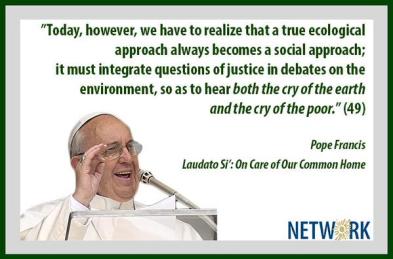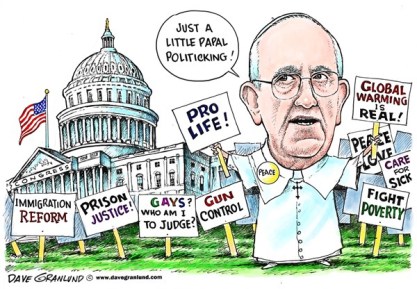
Pope Francis has earned himself a reputation as a rather unconventional pope. His comments about women, homosexuality and contraception, to name but a few, have set him apart from his predecessors. He has also committed himself to championing the environment – unchartered territory for Roman Pontiffs until now.
Laudato Si’ (Praise be to you) – subtitled “On Care for our Common Home” – was the first ever papal encyclical on the environment, released publicly on June 18th 2015. A papal encyclical is a papal document concerning Catholic doctrine, usually addressed primarily to bishops, archbishops, patriarchs and other senior clergy. However, breaking from tradition yet again, Laudato Si’ was addressed to everyone – not just clergy, Catholics or even Christians, but every person on the planet.

The Pope’s position has been controversial. On the one hand, he has ruffled the feathers of many Catholics by positing unequivocally that global warming is a reality and that Catholics have a religious obligation to prevent it. For a set of reasons too complex to explore here, many Catholics do not believe it is the Pope’s job to pontificate on such matters. On the other hand, secular liberal environmentalists are compelled to decide whether they will endorse the Pope’s position, despite strong differences of opinion on other matters (and, in fact, the finer details of how we should approach the fight against climate change).
Hilder (2007, p. 7) has observed that we are seeing a return to a pre-modern style of campaigning, when campaigning – often pioneered by religious movements – focussed on changing people rather than seeing politics as the primary route for social change. Pope Francis is an interesting case to consider in this context: he is not a politician, but he holds a position of great power and influence. Should we see his stance on the environment as an appeal to religious values, or as a political act? Perhaps both?

Change seekers are becoming increasingly aware that they need to engage with power (Gaventa, 2006, p. 23). Although campaigners may not typically see the Catholic Church as an ally for progressive social change, many seems willing to put aside their differences and embrace the Pope’s position due to his status as an important player on the world stage. His message certainly resonates with the anger of environmental activists: he casts blame on the indifference of the powerful, denounces a lack of concern for the poor and decries the commodification of humans and exploitation of nature.
But is this part of a trend towards elitism in social campaigning? The powerful are now more active players in social change, exacerbated by a decline in institutions which used to protect the poor (Hilder, 2007, p. 14 & p. 37). Is it a sign of the times that Pope Francis is the only Christian leader able to make significant headway in making environmental concern a moral obligation for Christians? The fact that his voice has become one of the most prominent on environmental issues is certainly significant, but the nature and scope of his influence is yet to be determined.
References:
Gaventa, J. (2006) Finding the Spaces for Change: A Power Analysis. IDS Bulletin, Volume 37 Number 6. Available at: http://www.powercube.net/wp-content/uploads/2009/12/finding_spaces_for_change.pdf
Hilder, P. et al (2007) Contentious citizens – civil society’s role in campaigning for social change (2007) The Young Foundation. Available at: http://youngfoundation.org/wp-content/uploads/2013/04/Contentious-citizens-Civil-societys-role-in-campaigning-for-social-change-May-2007.pdf
The powerful and prominent people are always key in the success of most campaigns, In Nigeria, most campaigns are usually organized by the opposition against the government in power and the reason for elitist or prominent people involvement in campaigning is basically because audiences can easily relate to them.
LikeLiked by 1 person
Great post! I’ve found the case of Pope Francis fascinating too (and, a breath of fresh air) regarding climate change, and you make some great points on this as a case study. I appreciated the question of whether his is an appeal to ‘religious’ or ‘political’ values. I’ve long held that these kind of distinctions are more permeable than Westerners like to think; for example, the notion that religiosity is an inherently private, apolitical thing is pretty recent (and not very credible in my view!). It’s great then to see Francis ‘pontificating’ with conviction on this particular issue – in a fractious world he is one of the few individuals who can command such substantial authority in appeals to conscience.
LikeLiked by 1 person
Great blog and really interesting questions! I remember that there was so much excitement last year when the encyclical Laudato Si was released. It would be interesting to analyse now over a year on how different campaign organisations and the Church have been influenced by it and used it within their communications.
LikeLiked by 1 person
Great blog! I was very happy to finally see a pope engaging with environmental issue, I wish religion would encourage more debates on this subject.
LikeLiked by 1 person